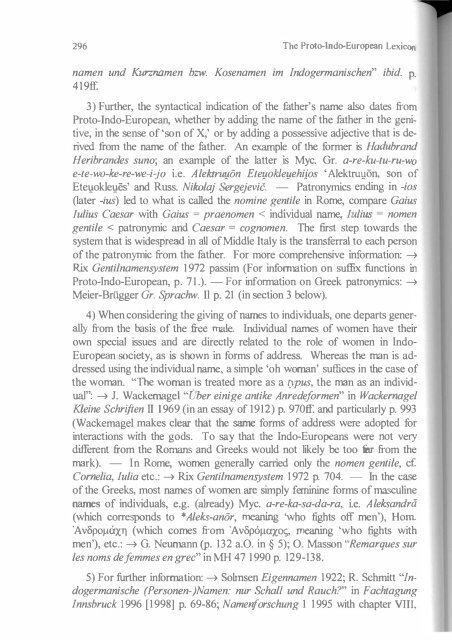You also want an ePaper? Increase the reach of your titles
YUMPU automatically turns print PDFs into web optimized ePapers that Google loves.
296 The Proto-Lndo-European LexiCOnnamen und Kurznamen bzw. Kosenamen im Indogermanischen" ibid. p.419ff.3) Further, the syntactical indication <strong>of</strong> the father's name also dates fromProto-lndo-European, whether by adding the name <strong>of</strong> the futher in the genitive,in the sense <strong>of</strong> 'son <strong>of</strong> X,' or by adding a possessive adjective that is derivedfrom the name <strong>of</strong> the futher. An example <strong>of</strong> the former is HadubrandHeribrandes suno; an example <strong>of</strong> the latter is Myc. Gr. a-re-ku-tu-ru-woe-te-wo-ke-re-we-i-jo i.e. Alekiruljon Eteljokleyehijos 'Alektruyon, son <strong>of</strong>Eteyokleyes' and Russ. Nikolaj Sergejevic. - Patronymics ending in -ios(later -ius) led to what is called the nomine gentile in Rome, compare Gaiuslulius Caesar with Gaius = praenomen < individual name, IlIlills = nomengentile < patronymic and Caesar = cognomen. The first step towards thesystem that is widespread in all <strong>of</strong> Middle Italy is the transferral to each person<strong>of</strong> the patronymic from the futher. For more comprehensive information: Rix Gentilnamensystem 1972 passim (For information on suffix functions inProto-Indo-European, p. 71.). - For information on Greek patronymics: Meier-Briigger Gr. Sprachw. Il p. 21 (in section 3 below).4) When considering the giving <strong>of</strong> names to individuals, one departs generallyfrom the basis <strong>of</strong> the free male. Individual names <strong>of</strong> women have theirown special issues and are directly related to the role <strong>of</strong> women in IndoEuropean society, as is shown in forms <strong>of</strong> address. Whereas the man is addressedusing the individual name, a simple 'oh woman' suffices in the case <strong>of</strong>the woman. "The woman is treated more as a typus, the man as an individual": J. Wackemagel "Uber einige antike Anredeformen" in WackernagelKIeine Schrifien Il 1969 (in an essay <strong>of</strong> 1912) p. 970ff. and particularly p. 993(Wackemagel makes clear that the same forms <strong>of</strong> address were adopted forinteractions with the gods. To say that the [ndo-Europeans were not verydifferent from the Romans and Greeks would not likely be too far from themark). - In Rome, women generally carried only the nomen gentile, cf.Cornelia, IlIlia etc.: Rix Gentilnamensystem 1972 p. 704. - In the case<strong>of</strong> the Greeks, most names <strong>of</strong> women are simply feminine forms <strong>of</strong> masculinenames <strong>of</strong> individuals, e.g. (already) Myc. a-re-ko-sa-da-ra, i.e. Aleksandrii(which corresponds to *Aleks-anor, meaning 'who fights <strong>of</strong>f men'), Hom'AvOpo!'





